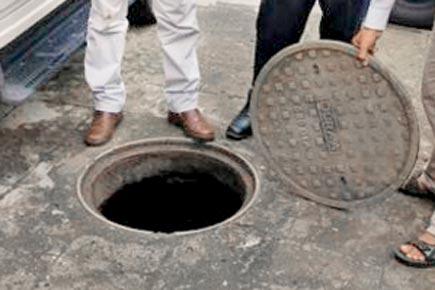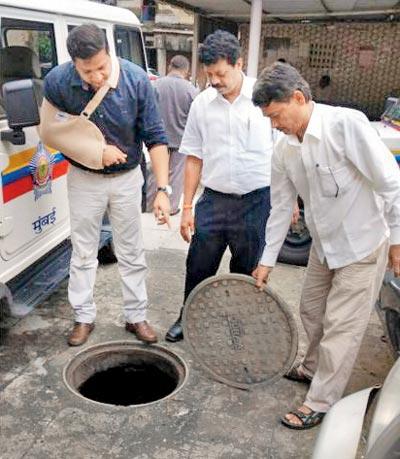Shiv Sena corporator Professor Avkash Jadhav plays detective, conducts a search and comes across neglected but sturdy sources of additional water; 53 of these tanks are still accessible


The tank in the Karwar Street police station premises
ADVERTISEMENT
Three months ago, when Professor Avkash Jadhav, a nominated corporator by the Shiv Sena, visited the Chhattrapati Shivaji Maharaja Vastu Sanghrahlay (formerly Prince of Wales Museum), he saw a BMC board that said ‘Static Water tank A-4’; it was in a corner. He later arranged for its opening and realised it had a capacity of 2.5 lakh litres of water and was at least 70 years old. This made Jadhav conduct a search, and today, he has a list of 66 such underground water tanks built by the British.
Below ground level
Two weeks ago, taking A-4 as a clue, Jadhav started looking for other tanks of the ‘A’ series and found out that there are six more in A ward. Over two weeks, he tried to gather information from other civic departments, namely the hydraulic and emergency repairing services along with Sub. Engineer Jeevan Patil and his assistant Ambekar, and found 66 static water tanks from A to G wards.
Watch Video: Devendra Fadnavis explores British-era bunker at Raj Bhavan
However, out of the 66, 13 tanks are either inaccessible or there are structures that have come around it. This means that in the island city, 53 water tanks are accessible. In all, the storage capacity could be almost 1.57 crore litres.
Rotting in neglect
“The tanks are uniform in size — 10 metre × 10 metre × 3 metre. They are still in very good condition and are fully concrete and strong in their establishment. Some of them have a perennial source of water and some require water to be filled from outside. They need a little repairing and maintenance to bring them back to their purpose of existence,” said Jadhav.
“I personally surveyed the tanks in A ward and felt sad to see how civic authorities have neglected them. The recent fire in Metro building and Express Towers in Colaba made our fire department struggle for water from nearby sources, whereas we had these tanks at the museum and also BPT garden, Colaba. Because they haven’t been maintained, even the fire brigade was not aware of their existence. If we take appropriate measures, we can avoid such situations in the future.”
Corrective steps
Jadhav said he now plans to write to the municipal commissioner, asking him to preserve, conserve and restore these tanks and, because they belong to the British era, put them under the heritage category. This would save the remaining tanks from getting dismantled, encroached upon or misused, he added.
According to Jadhav, the fire department should be made aware of their existence and the ward concerned should be allocated the responsibility of maintaining them. Jadhav wants these tanks to be specifically marked as water bodies and have a reference point in Development Plan 2034.
Mumbai needs almost 4,500 MLD (million litres per day). However, in spite of having five lakes and other sources, the BMC can provide around 4,000 MLD only.
 Subscribe today by clicking the link and stay updated with the latest news!" Click here!
Subscribe today by clicking the link and stay updated with the latest news!" Click here!






